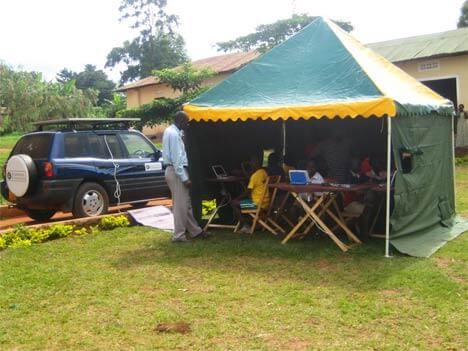An innovative venture led by chemists from the University of Southampton utilizes solar power generators to deliver hands-on information technology and science interests for students in developing countries

A major problem in studying science in developing countries, especially in rural schools, is that students are rarely able to get hands-on experience in scientific experiments. This is due to the lack of equipment, chemicals and facilities, but mainly due to the lack of electricity and running water.
Now, Professor Tony Rest, lecturer in chemistry at the University of Southampton, and Keith Wilkinson, a former teacher at the International School in Lusaka, Zambia, have come up with a solar-powered solution based on a digital projector and cheap solar panels, so students are able to access learning methods Advanced and computerized.
The professor explains: "The lack of electricity is a particularly serious matter for rural schools and it is unlikely that this situation will improve in the foreseeable future. In light of the shortcomings inherent in the use of gasoline generators, and in view of the difficulties in obtaining supplies and safety risks, solar energy-based generators have become available at inexpensive prices and provide a sustainable solution since in these areas there is an abundance of the basic energy source required for their operation - sunlight.
Most information/video projectors require 300-200 watts of power and cannot be economically feasible based on solar energy in remote villages. However, the use of mini-projectors, which required a power of 50 watts, revolutionized the situation and made the use of a battery-powered projector feasible.
The generators based on solar energy, which consist of solar panels, batteries and energy conversion devices, can be connected to the students' projector and enable the delivery of practical lessons through multimedia sources that present laboratory experiments and important practical methods.
The professor explains: "It is possible to expand these experiences to other scientific fields starting from physics, biology and mathematics, to fields involving practical factors such as engineering, and ending in the fields of art, such as plumbing, carpentry and catering. By increasing the range of areas that benefit from the use of information technology, the total cost of utilizing the activity of the generator based on solar energy is reduced. Another byproduct is that students in rural schools gain access to important information technology skills.”

4 תגובות
I wish a way would be found to make education accessible to third world countries as well.
The biggest achievement in my opinion is that they managed to find a reason to bring solar panels to remote villages.
Thanks. fixed
My father, with your honor's forgiveness...
Current is not measured in watts but in amperes, also energy is not measured in watts but in joules.
What is measured in the bot is the power.